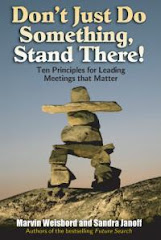Having for the second time in 20 years spent nearly 3 days with 86 people from 20 countries in a windowless, poorly-lighted hotel ballroom with an inadequate sound system I hereby testify that such rooms may serve candle-lit banquets but are harmful for serious work. The meeting was vital to the health care of third world countries. Given a deadline, we had no choice of rooms. And people, a tribute to their commitment, worked with good humor, intelligence and extraordinary patience under intolerable conditions. It was a non-stop battle against an environment that we could, with a little forethought, control. You could say we compromised our own short term well being for the long-term sake of those in greater need. But why? If I were king, I’d declare hotel dungeon rooms off limits for serious meetings. Since I’m a commoner, I beg my fellow citizens to rebel against dungeon rooms given the persuasive evidence that people ought not meet like this. Don’t rely on my prejudices. Check out the vast literature on the centrality of natural daylight to human health. Still, some people choose to work in the dark ages. I’m done with it folks. This time I really mean it!
Here are two items from last Sunday's paper that stiffen my resolve--
A team of University of Washington researchers put 50-inch TV screens showing a live view of nature into windowless faculty offices. “People liked this,” said the writer. “but in another study that measured heart-rate recovery from stress, the HDTV’s were shown to be worthless, no better than staring at a blank wall. What did help with stress was giving people an actual plate-glass window looking out upon actual greenery.”
--Bloom, Paul. “Natural Happiness.” The New York Times Magazine, April 19, 2009, pp. 11-13.
And from the same magazine, bottom of page 35--
“18 Average reduction in stay, in hours, at a suburban Pennsylvania hospital for patients recovering from gallbladder surgery whose window faced trees rather than a brick wall, according to a study in 1984 (Science magazine).”
--Marv Weisbord
Monday, April 27, 2009
Subscribe to:
Post Comments (Atom)
.jpg)

No comments:
Post a Comment